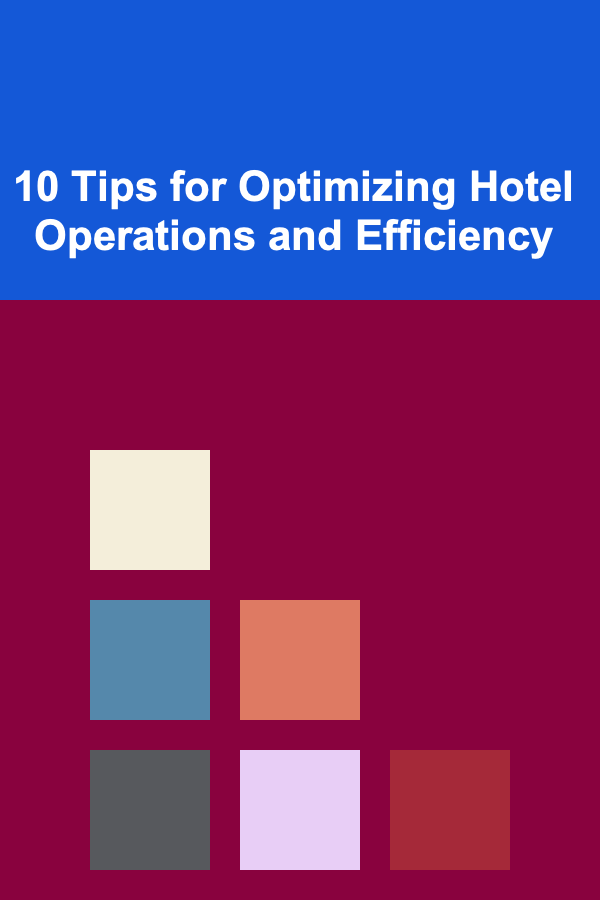
10 Tips for Optimizing Hotel Operations and Efficiency
ebook include PDF & Audio bundle (Micro Guide)
$12.99$11.99
Limited Time Offer! Order within the next:

Hotel management is a complex and dynamic field that requires constant attention to detail, flexibility, and the ability to adapt to a wide range of customer needs and operational challenges. The hospitality industry is fiercely competitive, and the key to standing out is optimizing operations to ensure smooth service, satisfied guests, and ultimately, profitability. In this article, we will explore 10 actionable tips for optimizing hotel operations and efficiency. These tips cover a wide range of areas, from staffing and technology to guest experience and cost management.
Leverage Technology for Streamlined Operations
The integration of technology in hotel operations has become a game-changer, not only enhancing the guest experience but also optimizing internal processes. Here are a few ways to leverage technology:
Property Management Systems (PMS)
A modern PMS can streamline front desk operations, manage reservations, and track guest preferences. This helps staff to be more organized and efficient, reducing errors and time spent on manual tasks. A good PMS should allow seamless check-in/check-out, facilitate quick room assignments, and provide access to real-time data.
Automation of Routine Tasks
From check-in kiosks to automated housekeeping requests, automating repetitive tasks can significantly reduce the workload on staff and ensure that your guests receive prompt and personalized service. Automated systems can also help with billing, reservations, and communication, allowing your team to focus on more important tasks.
Mobile Apps for Guest Engagement
Developing a hotel mobile app or using a third-party platform can enhance guest engagement. Guests can use the app to book rooms, request services, make payments, or even control in-room amenities like lighting and temperature. This not only improves efficiency but also gives guests more control over their stay.
Optimize Staff Training and Development
A well-trained, motivated team is key to delivering high-quality service and ensuring operational efficiency. Ensuring your staff is equipped with the knowledge and skills to handle various tasks efficiently can significantly improve both guest satisfaction and productivity.
Cross-Training Employees
Cross-training staff ensures that everyone has a basic understanding of various hotel departments. For example, front desk employees can be trained to assist with housekeeping or food and beverage service during peak hours. This flexibility can help optimize staffing during busy times and reduce downtime during slower periods.
Ongoing Development
Investing in continuous staff training and development is important for employee retention and operational efficiency. Offering courses on customer service, technology tools, and even leadership training ensures that employees stay engaged, improve their skill sets, and become more proficient in their roles.
Employee Satisfaction and Retention
Happy employees are more likely to provide exceptional service to guests. Ensuring that your team is satisfied with their work environment, compensation, and benefits can reduce turnover and enhance the overall productivity of the hotel. Conduct regular surveys, encourage feedback, and promote a culture of appreciation to keep morale high.
Enhance Communication Across Departments
Effective communication is essential for smooth hotel operations. Miscommunication between departments can lead to errors, delays, and poor guest experiences. It is crucial to implement a system that facilitates clear and consistent communication.
Centralized Communication Systems
Using a centralized communication platform allows different departments (e.g., front desk, housekeeping, maintenance, and food & beverage) to share real-time information. This ensures that everyone is on the same page, reducing misunderstandings and preventing delays.
Daily Briefings and Shift Handover
Hold daily briefings with department heads and shift handovers to discuss guest preferences, special requests, and maintenance issues. This ensures that all shifts are aware of important tasks, guest requests, and potential problems, allowing for a smoother transition and continuity of service.
Implement Energy Efficiency Measures
Energy costs can be one of the largest operational expenses for hotels. Implementing energy-efficient practices not only reduces costs but also supports sustainability efforts, which is increasingly important to modern travelers.
Smart Climate Control Systems
Installing smart thermostats and energy-efficient HVAC systems can significantly reduce energy usage. These systems can automatically adjust temperature settings based on occupancy levels and guest preferences, ensuring energy is used efficiently without sacrificing comfort.
LED Lighting
Switching to LED lighting throughout the hotel can reduce electricity consumption and the need for frequent bulb replacements. Additionally, using motion-sensor lighting in public areas or guest rooms can further optimize energy use.
Water Conservation Initiatives
Low-flow showerheads, faucets, and toilets can help reduce water consumption. Additionally, encouraging guests to reuse towels and linens can further contribute to sustainability and reduce laundry costs.
Optimize Inventory Management
Efficient inventory management ensures that the hotel always has the right amount of supplies without overstocking, which can lead to waste and unnecessary costs. This applies not only to physical items like linens and toiletries but also to food and beverage stock.
Automated Inventory Tracking
Using an automated inventory management system allows hotels to track stock levels in real-time, generate alerts when items are running low, and reorder supplies automatically. This prevents stockouts and minimizes overordering, reducing waste and excess costs.
Inventory Audits
Regular inventory audits help ensure that your hotel is not overspending on unnecessary items or losing track of valuable resources. Implementing a clear system for audits can improve accountability and prevent theft or mismanagement.
Improve the Guest Experience with Personalization
Personalized service is a major differentiator in the competitive hotel industry. By anticipating and meeting the specific needs of each guest, you can enhance satisfaction and increase loyalty.
Data-Driven Personalization
Use guest data, such as past preferences, room types, and special requests, to offer personalized recommendations and services. Personalized welcome amenities, room settings, and tailored communication (e.g., personalized emails or room preferences) help create a memorable experience for your guests.
Loyalty Programs
Implementing a loyalty program can encourage repeat business and increase direct bookings. Offering exclusive perks, such as early check-in, free upgrades, or discounts on future stays, can increase guest retention and foster long-term loyalty.
Maximize Room Occupancy with Dynamic Pricing
Dynamic pricing is a strategy that adjusts room rates based on demand, occupancy levels, and market conditions. By optimizing your pricing strategy, you can increase room occupancy and maximize revenue without sacrificing quality.
Revenue Management Tools
Using a revenue management system can help track booking patterns, predict demand, and optimize pricing in real-time. These tools use algorithms and historical data to suggest the best pricing strategy based on factors like day of the week, local events, and market trends.
Promotions and Discounts
Offering limited-time promotions, early-bird discounts, or special deals for longer stays can help attract guests during low-demand periods. Additionally, offering packages that include meals or activities can enhance the value proposition and drive bookings.
Optimize Housekeeping Operations
Housekeeping is one of the most important departments in any hotel, impacting guest satisfaction, cleanliness, and efficiency. Streamlining housekeeping operations ensures that rooms are cleaned efficiently and that turnover is quick.
Room Assignment Management
Use a system to assign rooms to housekeeping staff based on their location and the urgency of cleaning. By optimizing cleaning assignments, you can reduce unnecessary walking time and ensure that rooms are cleaned and ready for new guests in a timely manner.
Quality Control
Implement a quality control system to check the cleanliness and condition of rooms before they are handed over to guests. This ensures that any issues, such as missing amenities or maintenance problems, are identified and addressed promptly.
Enhance Security Protocols
Security is a top priority for any hotel, and ensuring the safety of guests and staff is essential to maintaining a positive reputation. Implementing strong security protocols helps prevent issues while ensuring a smooth operational flow.
Surveillance Systems
Use modern surveillance systems, including cameras and motion detectors, to monitor public areas, entrances, and hallways. Ensure that security personnel are well-trained and equipped to respond to potential security concerns.
Keyless Entry Systems
Keyless entry systems can improve security by reducing the risk of lost or stolen keys. Guests can use mobile apps or biometric verification to access their rooms, which reduces check-in time and enhances the overall guest experience.
Continuous Monitoring and Feedback
Lastly, constantly monitoring hotel operations and collecting guest feedback is essential for ongoing improvement. Regular assessments of operational efficiency, guest satisfaction, and financial performance provide insights into areas that need improvement.
Guest Surveys
Implement guest surveys or feedback forms to gather insights on their experience. Analyzing these responses can help you identify operational bottlenecks or areas where service quality can be enhanced.
Performance Metrics
Regularly track key performance indicators (KPIs) like occupancy rates, average daily rate (ADR), and revenue per available room (RevPAR) to assess the success of your operations. Use this data to make informed decisions about pricing, staffing, and resource allocation.
Conclusion
Optimizing hotel operations and efficiency is an ongoing process that requires continuous attention to detail, smart technology adoption, and a focus on guest satisfaction. By leveraging technology, improving staff training, and focusing on key operational areas such as energy management, inventory control, and dynamic pricing, hotels can streamline their operations and stay competitive in a fast-paced industry. In a crowded market, the hotels that prioritize operational efficiency and guest experience will undoubtedly lead the way.
Reading More From Our Other Websites
- [Weaving Tip 101] Best Methods for Adding Reinforced Edge Binding to Hand‑Woven Outdoor Curtains
- [Rock Climbing Tip 101] Flat vs. Downturned: Which Climbing Shoe Profile Is Right for Your Style?
- [Personal Care Tips 101] How to Create a Messy, Effortless Look with Hair Mousse
- [Personal Investment 101] How to Invest in Real Estate Crowdfunding
- [Beachcombing Tip 101] The Beachcomber's Guide to Identifying Rare Shells and Marine Finds
- [Home Security 101] How to Use Home Security Cameras with Cloud Storage for Seamless Monitoring
- [Personal Finance Management 101] How to Manage Finances for a Single Parent Household
- [Personal Care Tips 101] How to Choose a Perfume Based on Your Skin Type
- [Organization Tip 101] How to Incorporate Multi-Functional Furniture into Your Design
- [Personal Care Tips 101] How to Use Sunscreen When Swimming or Exercising Outdoors

How to Stage a Home for Virtual Tours and Online Listings
Read More
How to Use Smart Home Technology in Your Renovation
Read More
How To Think Critically About the World of Conspiracy Theories
Read More
How To Apply Stoicism to Navigating Political Discourse
Read More
How to Write Letters to Soldiers: A Comprehensive Guide
Read More
How to Build an Inclusive Event Planning Team
Read MoreOther Products

How to Stage a Home for Virtual Tours and Online Listings
Read More
How to Use Smart Home Technology in Your Renovation
Read More
How To Think Critically About the World of Conspiracy Theories
Read More
How To Apply Stoicism to Navigating Political Discourse
Read More
How to Write Letters to Soldiers: A Comprehensive Guide
Read More